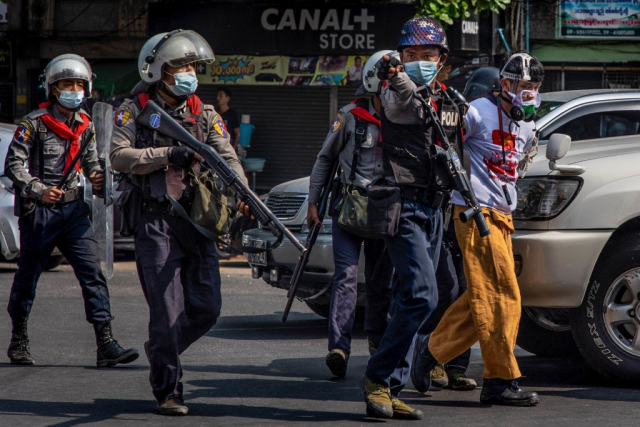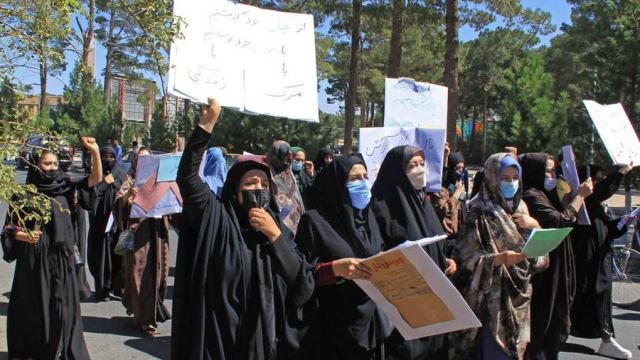Asia & Pacific – Civicus Monitor 2022

CRACKDOWN ON PROTESTS
Despite the global pandemic and restrictions, protests took place in at least 18 countries in the Asia region. Protesters were detained in at least 14 countries and the authorities used excessive force against protesters in at least 12 countries.
In Hong Kong, pro-democracy activists including Joshua Wong were convicted for their role in various peaceful protests and gatherings in 2019 and 2020, including protests against the country’s extradition law and a vigil commemorating the 1989 Tiananmen Square massacre.

In Myanmar, mass protests across the country by a civil disobedience movement following the February 2021 military coup were met with deadly violence by the ruling junta. Thousands have been arbitrarily arrested and detained and hundreds have been killed with impunity. In Thailand, pro-democracy leaders were detained and charged for their speeches during mass protests calling for reforms of the government and monarchy. Hundreds, including children, were investigated in connection with their protest activities. The Thai police also used excessive force, including live ammunition, against protesters.
In Indonesia, scores of activists protesting against the unilateral renewal of the Papua Special Autonomy Law in July and August 2021 were detained and met with excessive force. The law had long been rejected by many Papuans as failing to realise meaningful autonomy. In Malaysia, the authorities attempted to stifle a number of anti-government protests organised by the People’s Solidarity Secretariat – an ad hoc umbrella body of youth groups – including a candlelight vigil held in August 2021 for COVID-19 victims, where 31 were arbitrarily detained and ill-treated.
In India, the authorities vilified and repressed the farmers’ protest movement, which continued to hold protests until the government backed down and announced it would repeal controversial farming laws . Before the reversal, the authorities blocked roads to disrupt protests, arbitrarily detaining hundreds and using excessive force. Restrictions on peaceful assembly were also imposed in Indian-administered Jammu and Kashmir. In Sri Lanka, dozens of protesters including trade unionists and students were detained for protests organised since July 2021 against the militarisation of higher education and on labour rights and other issues. In Pakistan, Pashtun activists were detained and charged for their involvement in protests. Following the takeover of Afghanistan by the Taliban in August 2021, anti-Taliban protests were met with excessive force.
In the Pacific, protests were documented in seven countries. In Australia and New Zealand, scores of anti-lockdown protesters were detained in 2021 for violating COVID-19 regulations. In the Solomon Islands in August 2021, a march in Honiara to deliver a petition to the government by people from the Malaita province was disrupted and dispersed by the police.
TORTURE AND ILL-TREATMENT
Reports of torture and ill-treatment of activists were prevalent in Asia, occurring in at least 13 countries during the reporting period. In Myanmar, activists and protesters detained by the junta were allegedly tortured. In one case, more than 100 prisoners were crammed into a single room where it was difficult to move, had a gun pointed to their head during interrogations and were forced to eat from the concrete floor with hands cuffed behind their backs. Some were beaten and electrocuted.
In June 2021, the UN’s independent expert on human rights defenders raised concerns about activists in China being tortured, as well as being denied access to medical treatment, their lawyers and their families. In Vietnam, where over 200 political prisoners are locked up in a secretive network of prisons and detention centres, many have been held in prolonged periods of incommunicado detention and solitary confinement, inflicted with severe physical pain and suffering and had medical treatment withheld.
In Bangladesh, there have been widespread allegations of torture and ill-treatment by security forces. Writer Mushtaq Ahmed, who died in prison in February 2021, was allegedly subjected to severe abuse by the Rapid Action Battalion, an elite anti-terrorism unit, as was political cartoonist Kabir Kishore. Both were detained under the Digital Security Act. The International Truth and Justice Project released a report in September 2021 detailing incidents of torture by the Sri Lankan police and military against political prisoners.
In the Pacific, Papua New Guinean lawyer Laken Lepatu Aigilo was assaulted by the police in April 2021 and then kidnapped and threatened before he was detained. The incident occurred after he formally lodged a complaint of financial mismanagement against a politician.
COUNTRIES OF CONCERN: MYANMAR AND AFGHANISTAN

Myanmar saw a rapid decline in fundamental freedoms following the February 2021 coup, with the arrest, detention and criminalisation of hundreds of activists, including HRDs, trade unionists, journalists, political and student activists, doctors, poets, people from ethnic minorities, LGBTQI+ groups and artists. The junta used excessive force and firearms against protesters and disrupted the internet. Journalists were hunted down and dozens were arrested and charged. A number of political prisoners were allegedly tortured and ill-treated and there have been reports of sexual violence against women in detention centres. At the time of writing, according to the Assistance Association for Political Prisoners, 1,244 people had been killed and 7,122 people are currently in detention.
Another country of concern is Afghanistan, following the Taliban takeover in August 2021. There have been reports of activists facing systematic intimidation throughout the country. The Taliban are carrying out house-to-house searches for activists and journalists, particularly women, and interrogating them and their families. This has created a climate of significant fear and many have gone into hiding or have fled the country. The Taliban have also conducted raids on women-led CSOs across Afghanistan. Anti-Taliban protests, especially by women, in Kabul and other cities have been met with excessive force, gunfire and beatings to disperse crowds, leading to deaths and injuries of peaceful protesters. Journalists are at increased risk for covering the situation on the ground. Some covering the protests have been arbitrarily detained, tortured or ill-treated with impunity.

